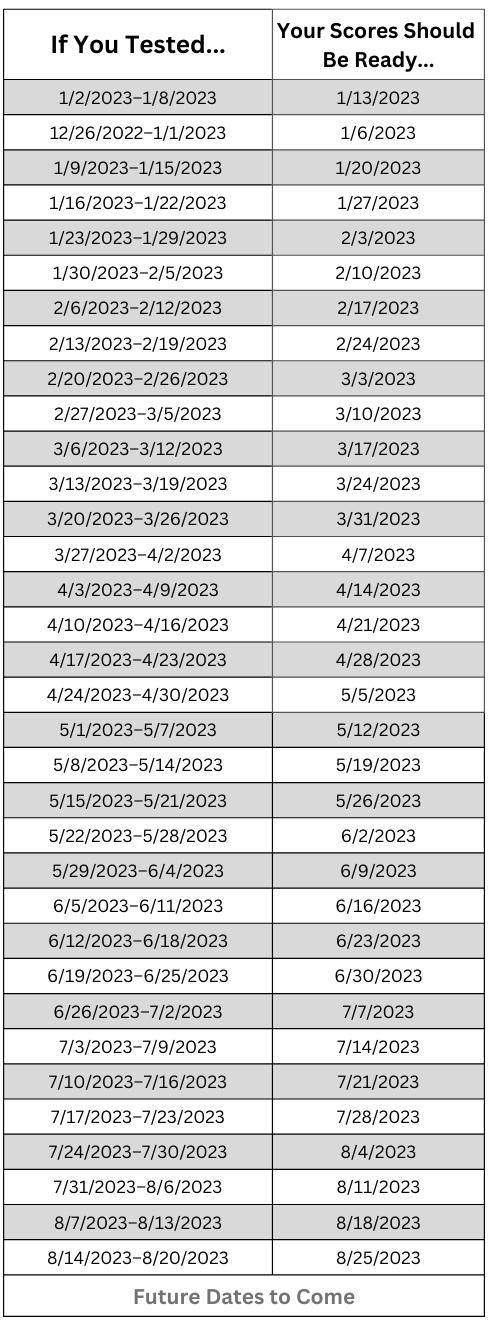In California, passing CBEST, or California Basic Educational Skills Test, is a requirement for aspiring school-related staff such as teachers, substitute teachers, and school counselors. It’s The Golden State’s version of Praxis Core and other basic educational skills tests required by states such as Texas and Florida.
Over the past five years, California’s test and processes have undergone some changes. Whether you are new to the process, or you started the testing process some time before 2018, took a break, and have decided to revisit it, this guide will help you avoid common pitfalls associated with trying to register for, successfully pass, and retrieve scores for CBEST Reading, CBEST Writing, and CBEST Math.


YOU MAY QUALIFY FOR A CBEST SUBTEST EXEMPTION
There’s a chance that you may meet your basic skills requirement without taking CBEST. Talk to your system administrator about using ACT, SAT, CSET: Multiple Subjects, other exams, or a combination of college coursework and exams to meet your basic skills requirement. For more information, visit The Commission on Teacher Credentialing, here.
You may have heard about the waiver program, which is especially beneficial to folks struggling with a single subtest (i.e., math, writing, or reading) of CBEST. If you fail one section of CBEST, you may apply to have that section waived by having your college transcript evaluated; this is the “combination of college coursework and exams” option mentioned in the previous paragraph. If you’ve earned a B or higher in a relevant subject, the agency to which you apply will document, upon request, your qualification for the test waiver. Be careful, though, as this can only be done once.
Let’s get busy getting you over your academic, professional, or personal hurdles.

CBEST SUBJECT MATTER
The test consists of three sections: reading, writing, and math. The reading and math sections each consist of 50 multiple-choice questions; the writing test consists of two essays. Be prepared to do all math by hand, as calculators are neither allowed nor provided.
The math section lasts 2 hours. The reading and writing sections each last 1.5 hours, and you’ll need to register for each test, separately. No longer are testers able to register for one, long, comprehensive, 4-hour test session. Additionally, if you need to retake any portion of the test, the retest session will last 1.5 hours – not 4 hours.
3. CBEST FORMAT
The paper version of the test is no longer administered; the computerized version of the exam is the only one available. You may register to take the test at an authorized testing center, or you may take the test at home.
4. HOW TO REGISTER FOR CBEST
You’ll register online. Pearson VUE seems to be the organization to which the actual testing process (i.e., registration and administration) has been outsourced. You’ll register for each test, individually, and you’ll pay for each test, individually.
You’ll receive both onscreen and email-bound confirmation of the appointment day(s), time(s), and location(s). Additionally, information will be provided about name(s) of test(s) and amount(s) paid for test(s).
5. COST TO TAKE CBEST
Each section costs $30. If you take one test, you’ll pay $30. If you take two tests, you’ll pay $60. If you take all three tests, you’ll pay $90. Regardless of the number of tests you plan to take in one day, you’ll still need to register and pay for each test separately.
For example, if register to take the CBEST: Math test, you’ll pay $30 because you’re taking only one test. If, however, you register to take CBEST: Math and CBEST: Writing, you’ll pay $60. Why? Because you’re taking two tests.
Question: how much will you pay if you take CBEST: Math, CBEST: Writing, and CBEST: Reading?
Answer: You’ll pay $90 because you’re taking all three tests.
6. WHERE TO TAKE CBEST
When you register with Pearson VUE, you’ll pass through a series of windows before coming to a window that allows you to enter your preferred location and the testing locations in close proximity to your preferred location. Some locations are official Pearson VUE locations. Other locations may be schools, supplemental educational offices, or business offices. Additionally, you may test at home or work, where you’ll be supervised, virtually, but a proctor.
7. DETERMINING IF YOU’VE PASSED CBEST
At minimum, testers need a cumulative score of 123, which means an average score of 41 needs to be attained for each section. There’s a wild card, though: testers can earn, at the very least, a 37 on one or two sections if the tester earns, a minimum of 41 on, at least, one section, and the sum of all sections equals – at the very least – 123.
Passing Scenarios
Scenario 1
Let’s suppose you earn a 41 on the math test, a 41 on the reading test, and a 41 on the writing test. You’ll have passed because you have earned no less than a 37 on two tests, and the sum of all three test scores is 123, which is exactly the minimum score you’d need to pass CBEST. Woo hoo!
Scenario 2
Let’s suppose you earn a 65 on the math test, a 55 on the reading test, and a 41 on the writing test. You’ll have passed because you have earned no less than a 37 on two tests, and the sum of all three test scores is 161, which is more than the minimum score of 123 needed to pass CBEST. Congratulations!
Scenario 3
Now, let’s suppose you earn a 65 on the math test, a 37 on the reading test, and a 37 on the writing test. You’ll have passed because you have earned no less than a 37 on two tests, and the sum of all three test scores is 139, which surpasses the minimum passing CBEST score requirement of 123. You’ve done it!
Failing Scenarios
Scenario 1
If you earn 41 on the reading test, 46 on the math test, and a 36 on the writing test, you’ll fail. Why? Although you’ve earned a sum of 123 for all tests, you’ve earned less than 37 on one test, which means you’ll need to retake the test for which you’ve earned a score of 36.
Scenario 2
If you earn 41 on the math test, 37 on the reading test, and 37 on the writing test, you’d still fail. Why? You’ve guessed it: although you’ve earned a minimum of 37 on each test, the sum of all scores equals 115, which is less than the required passing sum of 123.
Don’t fret. Just be prepared to strengthen your weak areas, prepare a CBEST study plan that works for y-o-u. If the thought of figuring out how to effectively prepare to pass CBEST overwhelms or annoys you, there’s help.
8. WHEN TO EXPECT CBEST SCORES
Scores take up to two weeks to arrive. For testers who sit for exams at testing centers, preliminary scores for math and reading tests will be issued at the test center, along with a receipt of completion. Unfortunately, preliminary scores for writing tests aren’t available.
For testers who take the test virtually, neither preliminary scores nor a receipt of completion are offered. Please, also keep in mind that scores can be delayed for up to two weeks. In all, it may take up to four weeks to receive all scores for CBEST: Reading, Writing, and Math.
Score Reports for 2023

EXPIRATION
CBEST scores have no expiration date, but Pearson has a one-year expiration date. Pearson will hold your scores in its system for 12 months, so be sure to download, print, and carefully store copies of your scores.
ACCESS
When your scores are ready, you should receive an email from Pearson that includes a link to your account. Log into your account to access your scores. As mentioned before, after receiving your scores, download and print copies. If you don’t receive scores two weeks after the prescribed dates, contact Pearson directly to ensure the correct contact information is on file for you.
9. POLICY ON RETAKING CBEST
Scores take up to two weeks to arrive. For testers who sit for exams at testing centers, preliminary scores for math and reading tests will be issued at the test center, along with a receipt of completion. Unfortunately, preliminary scores for writing tests aren’t available.
10. REFUND FOR CBEST
Because you’ll pay Pearson VUE, Pearson VUE will be responsible for refunds. Per the company’s policy, you qualify for a refund as long as you request one no less than 24 hours before the start of your scheduled appointment.
11. RESCHEDULING OR CANCELING CBEST
You may reschedule or cancel CBEST: Reading, Writing, or Math no less than 24 hours before the start of your scheduled session.
12. PREPARATION FOR CBEST
Don’t take for granted that you know all the material. Let me type it again:
DON’T TAKE FOR GRANTED THAT YOU KNOW ALL THE MATERIAL. You’ve probably assumed that there’s no way a potential tester, who is — more likely than not — a college graduate, will have trouble passing a basic skills exam. You’ve assumed incorrectly. Without delving into the pitfalls associated with attending and graduating colleges, let’s just say that many folks get a degree by jumping through a bunch of proverbial hoops without having ideas about what learning really is or without being challenged in their weak areas, even at basic levels.
To make sure you’re ready, try one of the following:
a) Taking the practice tests provided on the CTC’s website;
b) Getting a CBEST study manual from your local library’s selection of test prep materials; or
c) Hiring a private tutor or test prep coach.
CONCLUSION
For some folks, navigating this process and passing the test are simple undertakings. For others, a little guidance is needed. If you need a little help, visit The California Commission on Teacher Credentialing, or reach out to me, here.
Works Cited
CBEST. California Commission on Teacher Credentialing, https://www.ctcexams.nesinc.com/TestView.aspx?f=HTML_FRAG/CA_CBEST_TestPage.html.
FAQ-Examinations. California Commission on Teacher Credentialing, 9 January 2020, https://www.ctc.ca.gov/credentials/faq/faq-exams.